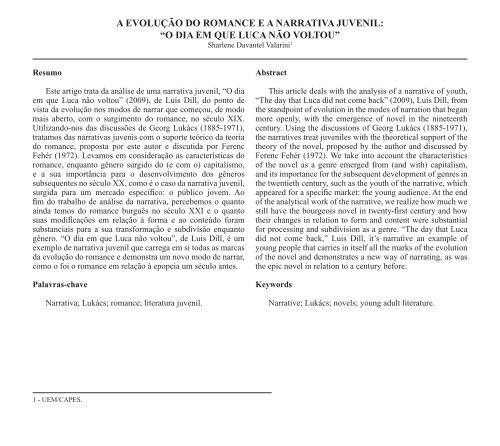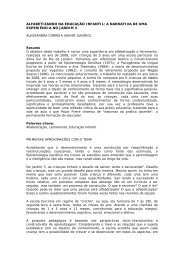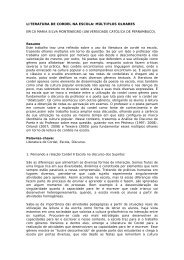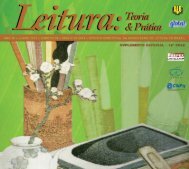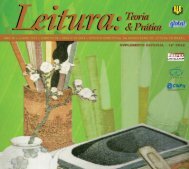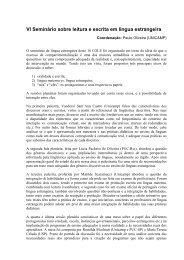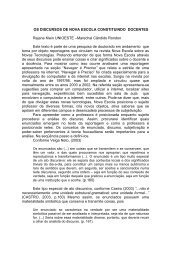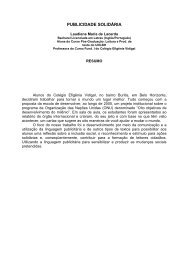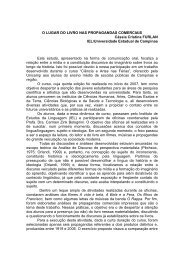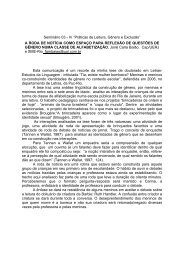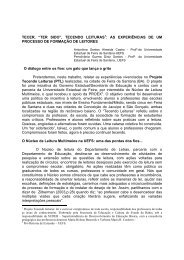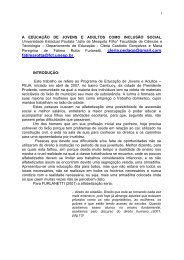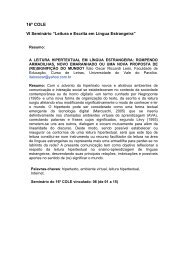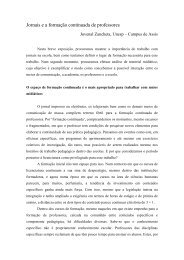Artigos do 18° COLE publicados na revista LTP - 9ª parte
Artigos do 18° COLE publicados na revista LTP - 9ª parte
Artigos do 18° COLE publicados na revista LTP - 9ª parte
You also want an ePaper? Increase the reach of your titles
YUMPU automatically turns print PDFs into web optimized ePapers that Google loves.
Resumo<br />
1 - UEM/CAPES.<br />
A EVOLUÇÃO DO ROMANCE E A NARRATIVA JUVENIL:<br />
“O DIA EM QUE LUCA NÃO VOLTOU”<br />
Sharlene Davantel Valarini 1<br />
Este artigo trata da análise de uma <strong>na</strong>rrativa juvenil, “O dia<br />
em que Luca não voltou” (2009), de Luís Dill, <strong>do</strong> ponto de<br />
vista da evolução nos mo<strong>do</strong>s de <strong>na</strong>rrar que começou, de mo<strong>do</strong><br />
mais aberto, com o surgimento <strong>do</strong> romance, no século XIX.<br />
Utilizan<strong>do</strong>-nos das discussões de Georg Lukács (1885-1971),<br />
tratamos das <strong>na</strong>rrativas juvenis com o suporte teórico da teoria<br />
<strong>do</strong> romance, proposta por este autor e discutida por Ferenc<br />
Fehér (1972). Levamos em consideração as características <strong>do</strong><br />
romance, enquanto gênero surgi<strong>do</strong> <strong>do</strong> (e com o) capitalismo,<br />
e a sua importância para o desenvolvimento <strong>do</strong>s gêneros<br />
subsequentes no século XX, como é o caso da <strong>na</strong>rrativa juvenil,<br />
surgida para um merca<strong>do</strong> específi co: o público jovem. Ao<br />
fi m <strong>do</strong> trabalho de análise da <strong>na</strong>rrativa, percebemos o quanto<br />
ainda temos <strong>do</strong> romance burguês no século XXI e o quanto<br />
suas modifi cações em relação à forma e ao conteú<strong>do</strong> foram<br />
substanciais para a sua transformação e subdivisão enquanto<br />
gênero. “O dia em que Luca não voltou”, de Luís Dill, é um<br />
exemplo de <strong>na</strong>rrativa juvenil que carrega em si todas as marcas<br />
da evolução <strong>do</strong> romance e demonstra um novo mo<strong>do</strong> de <strong>na</strong>rrar,<br />
como o foi o romance em relação à epopeia um século antes.<br />
Palavras-chave<br />
Narrativa; Lukács; romance; literatura juvenil.<br />
Abstract<br />
This article deals with the a<strong>na</strong>lysis of a <strong>na</strong>rrative of youth,<br />
“The day that Luca did not come back” (2009), Luis Dill, from<br />
the standpoint of evolution in the modes of <strong>na</strong>rration that began<br />
more openly, with the emergence of novel in the nineteenth<br />
century. Using the discussions of Georg Lukács (1885-1971),<br />
the <strong>na</strong>rratives treat juveniles with the theoretical support of the<br />
theory of the novel, proposed by the author and discussed by<br />
Ferenc Fehér (1972). We take into account the characteristics<br />
of the novel as a genre emerged from (and with) capitalism,<br />
and its importance for the subsequent development of genres in<br />
the twentieth century, such as the youth of the <strong>na</strong>rrative, which<br />
appeared for a specifi c market: the young audience. At the end<br />
of the a<strong>na</strong>lytical work of the <strong>na</strong>rrative, we realize how much we<br />
still have the bourgeois novel in twenty-fi rst century and how<br />
their changes in relation to form and content were substantial<br />
for processing and subdivision as a genre. “The day that Luca<br />
did not come back,” Luis Dill, it’s <strong>na</strong>rrative an example of<br />
young people that carries in itself all the marks of the evolution<br />
of the novel and demonstrates a new way of <strong>na</strong>rrating, as was<br />
the epic novel in relation to a century before.<br />
Keywords<br />
Narrative; Lukács; novels; young adult literature.


